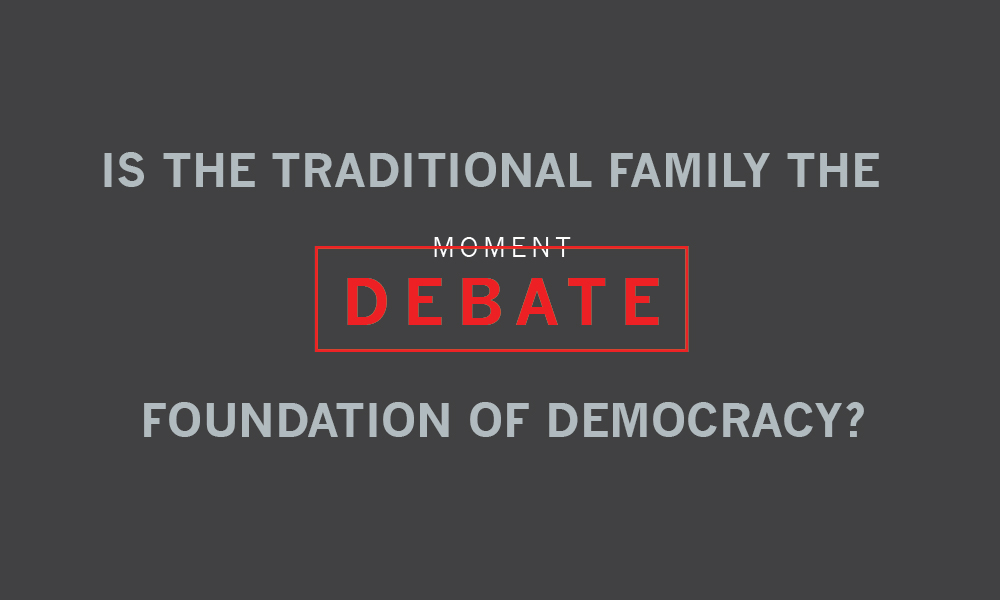Is the traditional family the foundation of democracy?
It depends what kind of traditional family you’re talking about. Throughout most of European and American history, the family was organized around a patriarch with power over slaves, servants, poorer neighbors and his sons and daughters. Those families were the foundation of inequality.
Our founding fathers didn’t idealize “family values.” They believed married men were better than bachelors because they exercised control over their families, but the “better” sort of man was one who put public passions before private ones. The essence of Republican virtue was to put the public welfare above private commitments.
Only in the mid-19th century did people develop the idea that the family itself was the cornerstone. Conservative evangelicals turned their backs on the social reform efforts of their antebellum counterparts and began to say that family loyalties, not civic ones, were the basis of morality. Henry Ward Beecher argued that “the family is the digesting organ of the body politic. The very way to feed the community is to feed the family.” Taking care of your family became an excuse for not providing for the broader social welfare.
Mona Charen: ‘We’ve lost touch with what gives our lives shape and significance’
Were families ever “traditional”?
The family most people think of as “traditional” was a relatively late invention. In the 19th century, political and economic trends undermined patriarchy, giving younger men more freedom from their elders. Most families still relied on the labor of wives and children.
The 1950s family was not traditional at all. For the first time, most families were organized around a male breadwinner, a stay-at-home mother and children who went to school. Two conditions made that family predominant. One was positive: Strong unions and the reforms of the New Deal created more job security and rapidly rising wages for many male workers, allowing them to support a family in which women could stay home. But the other force was not at all democratic: The exclusion of women from jobs that paid a living wage meant that most had no alternative to getting and staying married. Husbands controlled the family property and even had the legal right to rape their wives.
To the extent that some of these families did work well, it was because they were paternalistic rather than democratic—some men gallantly chose not to take advantage of their legal and economic power over their wives and children.
What effect has feminism had on families?
It turns out feminism is very good for families. True, when women started demanding equality, norms had to change, and that led to a lot of conflict and rising divorce rates. But those rates have since fallen. In Europe, divorce rates are now lower in dual-earner families than in male-breadwinner ones. Today, unlike in the past, families where the husband and wife share housework and childcare report higher marital and sexual satisfaction than more traditional couples. And feminism has helped convince men to triple their time with children since the 1960s.
If we really want to build families that are cornerstones of democracy, we need to invest in supports that allow mothers to participate fully in the workforce, men to participate in child-rearing and children to thrive. That means ending the ridiculously high poverty rates for children in America. One recent study found that when very low-income households have their incomes raised, not only do the kids in those families get more education and become less likely to commit crimes or experience a teen birth, they’re also more likely to vote when they turn 18.
Are there other forces in society undermining stable families?
Accelerating inequality of wealth and income, job insecurity, declining social mobility: These are anti-democratic trends, and they’ve made family relationships much harder to build and sustain. Far from being a cornerstone of democracy, the ideal of a male-breadwinner family has become an excuse for the failures of democracy, allowing politicians to blame poverty and community disruption on non-marriage or single motherhood rather than on mass incarceration, falling real wages, persistent racism and unequal opportunity for women.
Some people think lower-income people don’t value families, but studies completely disprove that. Lower-income people have the same family values as higher-income people but see fewer ways of acting upon them. Male wage erosion and job loss make marriage choices more risky for women. Economic stress and insecurity lead to coping mechanisms, such as alcohol abuse, that are hard on relationships. Chronic economic stress is a bigger predictor of which marriages will last than family of origin issues such as having divorced parents.
Does the government have an obligation to support families or encourage a particular kind of family?
The government should help everybody get the equal start we need in this economy—health insurance, preschool, access to higher education and jobs that pay a living wage. There’s considerable evidence that democratic political and economic structures allow all families to function better, whatever their form. Democratic access to health care takes pressure off single earners. Equal access to education and family-friendly work policies stabilize family life. So you could say that actually, democracy is the foundation of successful family life, not the other way around.
Gay marriage is another example of how democracy is good for families. The suicide rate among gay teenagers went down in states that legalized same-sex marriage. That’s partly because these families got more access to legal rights and social respect.
Does Judaism offer insight into these questions for you?
It does. Besides valuing family life, Judaism has a long tradition of supporting larger community institutions.
Stephanie Coontz is the author of The Way We Never Were: American Families and the Nostalgia Trap and Director of Research for the Council on Contemporary Families.

